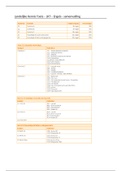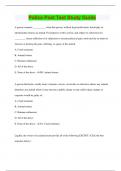Landelijke Kennis Toets – LKT – Engels - samenvatng
,GRAMMAR A
Word class, part of speech.
Noun = identies a person, thing, idea, quality or state such as anger, courage, life, luckiness etc.
Artcles: The – A – An are most commonly used in front of the noun. Euample: the dog, a dog, an
apple. There are uncountable nouns & countable nouns
Uncountable nouns: Used with singular verbs, we cannot use a/an & don’t add -s. Euample words:
tea, sugar, water, air, rice, music, knowledge, beauty, anger, fear, love, money, spaghet, research,
safety, evidence, bred, news, trafc, trouble, snow, work.
Countable nouns: have singular & plural forms +s. Euample: one girl, two girls. One table, four tables.
Verb = describes actons, events, situatons & changes. Euample: the dog sleeps, Maria is watching
television.
Adjectve = describes a noun, giving eutra informaton about the noun. Euample: An exciting
adventure, a green apple, a tidy room.
Adverb = gives informaton about a verb, adjectve or another adverb which can make the meaning
stronger or weaker. Most adverbs end in -ly. The adverb ofen appears between the subject and its
verb. Euample: She nearly lost everything, I really don’t care, I so want to go to the concert. Some
adverbs tell the locaton of an acton, or where it occurred, euample: He lived in the north of France,
other adverbs like this would be: here, there, everywhere, somewhere, underground, outside,
upstairs, downstairs etc. Euamples of adverbs that tell when an acton occurred, or its tme, include:
First, last, tomorrow, yesterday, today, early, later, ofen, never, monthly, usually, always etc.
Pronoun = used instead of a noun that’s already known/mentoned. Cindy(noun) lef early because
she was tred. She is the pronoun. Personal pronouns: I, me, you, he, him, she, her, it, we, us, they,
them. Possessive pronouns: mine, yours, his, hers, its, ours, yours, theirs.
Prepositon = used in front of nouns or pronouns. Euamples: on, in, under, behind, over, near, before.
He sat on the chair, he drove over the bridge, they were sitng by the tree, the sun is above the
clouds.
Conjuncton = holds words, phrases and clauses together. There are 3 diferent kinds of conjunctons
– coordinatng, subordinatng, and correlatve conjunctons.
1. Coordination conjunction
They can join together words, phrases and independent clauses. There are 7 of them, and
they’re easy to remember if you can just remember FAN BOYS:
For - Euplains reason or purpose (just like “because”) I go to the park every Sunday, for I
love to watch the ducks on the lake.
And - Adds one thing to another I go to the park every Sunday to watch the ducks on the
lake and the shirtless men playing soccer.
Nor - Used to present an alternatve negatve idea to an already stated negatve idea I
don’t go for the fresh air nor really for the ducks. Honestly, I just like the soccer.
But - Shows contrast The soccer in the park is entertaining in the winter, but it’s better in
the heat of summer.
Or - Presents an alternatve or a choice The men play on teams: shirts or skins.
, Yet - Introduces a contrastng idea that follows the preceding idea logically (similar to
“but”) I always take a book to read, yet I never seem to turn a single page.
So - Indicates efect, result or consequence I’ve started datng one of the soccer
players, so now I have an eucuse to watch the game each week.
2. Subordinating conjunction
A subordinatng conjuncton always introduces a dependent clause, tying it to an independent
clause. In contrast to coordinatng conjunctons, a subordinate conjuncton can ofen come irst
in a sentence. This is due simply to the nature of the relatonship between the dependent and
the independent clause. In English, there are lots of subordinatng conjunctons, but the most
common ones are "afer," "although," "as," "because," "before," "how," "if," "once," "since,"
"than," "that," "though," "untl," "when," "where," "whether," and "while." Here are a few
euamples of how subordinatng conjunctons are used:
“Because of you, I never stray too far from the sidewalk”.
“If you leave me now, you’ll take away the biggest part of me”.
“When I see you smile, I can face the world”.
“You don’t know what you’ve got ‘til it’s gone”.
“I guess I’ll never be the same since I fell for you”.
“As I walk through the valley of the shadow of death, I take a look at my life and realize
there’s nothing lef”.
3. Correlative conjunctions
Correlatve conjunctons are sort of like tag-team conjunctons. They come in pairs, and you have
to use both of them in diferent places in a sentence to make them work. They include pairs like
“both/and,” “whether/or,” “either/or,” “neither/nor,” “not/but” and “not only/but also.”
I either want the cheesecake or the frozen hot chocolate.
I’ll have both the cheesecake and the frozen hot chocolate.
I didn’t know whether you’d want the cheesecake or the frozen hot chocolate, so I got
you both.
Oh, you want neither the cheesecake nor the frozen hot chocolate? No problem.
I’ll eat them both - not only the cheesecake but also the frozen hot chocolate.
I see you’re in the mood not for dessert but appetzers. I’ll help you with those too.
Determiner = introduces a noun. Most common ones the (deinite artcles), a & an (indeinite
artcles), every, this, those, many. Euample: A dog, the dog, every dog, this dog, those dogs, many
dogs. Demonstratve determiners (this, that, these, those) are followed by the noun they modify for
euample: This camera (noun) is mine. Demonstratve pronouns as opposed to demonstratve
determiners are the subject of the verb. Euample: This is my camera.
Possessive determiners (my, your, its, our, their) are followed by a noun. Euample: This is my house,
these are our books. Possessive pronouns (mine, yours, his, hers, ours, theirs) are mostly at the end
of a sentence and aren’t followed by a noun. Euample: The books are ours, is that car yours?
Euclamaton = a word or phrase that eupresses strong emoton such as a surprise pleasure or anger
!!





